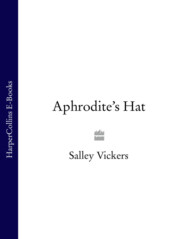По всем вопросам обращайтесь на: info@litportal.ru
(©) 2003-2024.
✖
Miss Garnet’s Angel
Автор
Год написания книги
2019
Настройки чтения
Размер шрифта
Высота строк
Поля
She did not know why she had used those words as she moved off, frightened to stay longer lest the unfamiliar beauty so captivate her that she turn to stone, as she later amusingly phrased it to herself. But it was true it was a kind of fear she felt, almost as if she was fleeing some harrowing spectre who stalked her progress. Across another campo, then over bridges, along further alleys, past astonishing pastries piled high in gleaming windows, past shops filled with bottled liquor, alarming knives, swathes of patterned paper. Once she passed an artists’ suppliers where, in spite of the spectre, she stopped to admire the window packed with square dishes heaped with brilliant coloured powders: oro, oro pallido, argento, lacca rossa–gold, silver, red, the colours of alchemy, thought Miss Garnet, hurrying on, for she had read about alchemy when she was teaching the Renaissance to the fifth form.
At the edge of the Piazza she halted. Let the spectre do its worst, for here was the culmination of her quest. Before her stood the campanile, the tall bell-tower, and behind it, in glimmering heaps and folds, in gilded wings and waved encrustations, emerged the outline of St Mark’s. People might speak of St Mark’s as a kind of dream but Miss Garnet had never known such dreams. Once, as a child, she dreamed she had become a mermaid; that was the closest she had ever come to this.
Measuring each step she walked across the Piazza. Although still afternoon the sky was beginning to darken and already a pearl fingernail clipping of moon was appearing, like an inspired throwaway gesture designed to point up the whole effect of the basilica’s sheen. Reaching the arched portals Miss Garnet stopped, wondering if it was all right to go on. But it must be, look there were other tourists–how silly she was, of course one didn’t have to be a Christian to enter and inspect a renowned example of Byzantine architecture.
Inside the great cathedral before her a line of people shuffled forward. Above her, and on all sides, light played and danced from a million tiny surfaces of refracted gold. A dull smell of onions disconcertingly filled her nostrils. What was it? Years of sweat, perhaps, perfusing the much-visited old air.
There appeared to be a restriction on where one might walk, for barriers and ropes were prohibiting entrances here, blocking ingress there. ‘But why are those people allowed?’ queried Miss Garnet. For there were men and women but mostly, it must be said, the latter, moving into the great interior space from which the swaying line of visitors was debarred. She stopped before an official in navy uniform. ‘Vespero?’ he enquired and ‘Si, si,’ she found herself replying for whatever it was she was not going to be shut out a second time that day.
The official detached the wine-coloured rope from its catch and ushered the Signora in the black veil through. ‘Look, it’s our little duchess,’ Cynthia Cutforth exclaimed to her husband. ‘She’s joining the service, she must be a Roman Catholic. See how cute she looks in her veil.’
But Miss Garnet was oblivious to all but the extraordinary surroundings in which she now found herself. Silver lamps burned dimly in the recesses. Above her and on all sides loomed strange glittering mosaic figures, in a background of unremitting gold. A succession of images–lions, lambs, flowers, thorns, eagles, serpents, dragons, doves–wove before her startled eyes a shimmering vision, awful and benign. Like blood forcing a route through long-constricted arteries a kind of wild rejoicing began to cascade through her. Stumbling slightly she made her way to a seat on the main aisle.
There was a thin stapled book of paper on the seat and picking it up she saw ‘Vespero Epifania’. Of course! Epiphany. How stupid she had been. January the sixth was the English Twelfth Night when the Lord of Misrule was traditionally abroad and one took down one’s Christmas decorations to avert ill luck. But here, in a Catholic country, the journey of the Magi, who followed the star with their gifts for the baby who was born in the manger, was still celebrated. That was the meaning of the three kings who had graced the Campo Angelo Raffaele that afternoon.
Later, as Miss Garnet emerged from the service the crescent moon had vanished from the sky and instead a lighted tree was shining at the far end of the Piazza. Along the colonnades, which framed the square, hung lavish swags of evergreen, threaded and bound with gold and scarlet ribbon. They do not bother to avert ill luck here, thought Miss Garnet as she retraced her way home. There was a peace in her heart which she did not quite understand. But, as she paced unafraid towards the Campo Angelo Raffaele she understood enough not to ask the meaning of it.
When she had returned to Signora Mignelli’s apartment, Miss Garnet, who had never in her life gone to bed without first hanging up her clothes, had simply stepped out of them, shoes, coat, hat, blouse, skirt, petticoat, underwear, all, and left them, an untidy pool, in the middle of the marble floor. They were the first thing she found the following morning. Reaching up to the top of the wardrobe to put away Harriet’s hat, her hand knocked against something and the picture of the Virgin and Child crashed to the ground.
The picture itself seemed unharmed but the glass was broken. Dismayed, Miss Garnet examined it. The Virgin’s calm visage stared out through shards of glass. I will have to find a glass-cutter, determined Miss Garnet.
Outside some boys were kicking a football and among them she recognised the tallest Magi. ‘Scusi,’ called Miss Garnet from the balcony and the boy ran across and stood politely below. She held up the fractured glass. ‘Scusi. Broken.’
Surprisingly, the boy appeared to comprehend. He beckoned vigorously, indicating that she should join him. Miss Garnet bundled herself back into her coat and hat. Shoving the Virgin and Child into a polythene bag she hurried down the stairs. Some letters on the mat caught her attention; two had British stamps and she pushed them into her pocket, adjusting Harriet’s veil with her other hand.
Outside, in the cold sunlight, the boy was waiting.
‘You want glass?’ he asked.
Miss Garnet was astonished. ‘You speak English!’ she cried and then, thinking this sounded too like an accusation, ‘you speak very well.’
‘Thank you.’ The boy lowered his eyelashes in appreciation. ‘My father say if I speak English good he send me to Londra.’
‘Oh, then perhaps you would like to speak it with me?’
She spoke slowly but the boy did not immediately understand. Then he favoured her with a perfect smile. ‘Si, Signora, I speak with you. My name is Nicco.’
Miss Garnet, unused to such physical charm, blushed. ‘Hello, Nicco, my name is…’ but how was the child going to manage ‘Miss Garnet’? So, ‘Julia,’ she concluded and blushed again.
Nicco smiled showing stunning teeth. ‘You want glass, Giulia?’
With a child’s acceptance he did not ask her how the accident had occurred but simply led her over bridges and along a calle until they reached a shop on the fondamenta where a man with a workman’s rubber apron and a red woollen hat sat over a wide sheet of brilliant blue glass. Nicco turned to his companion. ‘Here,’ he said, proudly, ‘glass.’
Miss Garnet offered the broken Virgin awkwardly to the man in the hat to whom Nicco was speaking rapidly. ‘Please,’ she said, ‘can you mend?’
Seeing the picture the man smiled broadly. Miss Garnet was relieved to notice that his teeth, unlike Nicco’s, were in a state of bad repair. ‘Bellini!’ he exclaimed, ‘Bellissimo Bellini,’ and he kissed his fingers in a way that Miss Garnet had seen only in films or on TV.
‘He likes very much,’ Nicco gravely explained.
‘But he can do it, he will mend the glass?’
In reply the man with the woolly hat held up a thick forefinger. ‘Si, Signora, in wan ower, OK?’ He spoke with exaggerated enunciation, displaying his tarry teeth.
What a relief, Miss Garnet said to herself and then, because she was jubilant that she had negotiated her first Venetian disaster, ‘Nicco, may I buy you lunch?’
Nicco, who did not at first understand her suggestion, became enthusiastic when the penny dropped. He led her to a Trattoria-Bar where he ordered a toasted cheese and ham sandwich and a Coke. Miss Garnet, daringly, chose gnocchi. The gnocchi came in a pale green sauce and was the most delicious thing she thought she had ever tasted. ‘Carciofi,’ Nicco said, when asked for the name of the green ingredient and cupped his hands in an effort to mimic an artichoke. She did not understand and then became distracted by the sudden appearance of a large glass of what appeared to be brandy.
‘For you,’ Nicco said proudly. ‘Is my cousin.’ He pointed at the young man who had produced the drink. ‘He say “Hi!”.’
‘Freddo!’ Nicco’s cousin clapped his arms around himself to indicate cold.
Miss Garnet was not a teetotaller but she rarely drank. A lifetime of abstemiousness had bred in her a poor head for alcohol. Nevertheless it seemed impolite to decline the courtesy. And really the brandy was most acceptable, she thought, as she sipped the contents of the big-bellied glass.
‘My cousin say, you like another?’
‘No, please, it was delicious. Please thank him, Nicco, just the bill.’
Miss Garnet felt unusually jolly as she and Nicco walked single file along the side of the green canal back to the glass-cutter. The light, refracting off the water on to the shabby brick frontages of the houses, bathed her eyes. The brandy had warmed her and a sense of wellbeing suffused her body.
Re-entering the glass-cutter’s Miss Garnet nearly knocked into a man on his way out and almost dropped the purse she had ready, so eager was she to complete the transaction which would restore Signora Mignelli’s picture. The glass-cutter had the repaired Virgin out on his bench but when Miss Garnet began to count the notes from her purse Nicco, who had been exchanging some banter with the departing customer, stopped her.
‘Is free,’ he explained.
Miss Garnet did not comprehend. ‘Three what, Nicco? Thousand, million?’ She prided herself on her mental arithmetic but the huge denominations of Italian currency still tripped her up.
‘No, no, is free.’
‘Oh, but I can’t…’
The glass-cutter was holding up the picture, excitedly stabbing at the Virgin’s face. ‘Bellissimo,’ he insisted, ‘per niente–is now charge. I give yow.’
Following Nicco back along the fondamenta Miss Garnet felt both subdued and elated. The refusal of the glass-cutter to accept a fee troubled her; and yet his powerful assertion of his own autonomy was also exhilarating. Karl Marx, she couldn’t help thinking, would have approved even if he would have deplored the glass-cutter’s motive. A love of the Virgin Mary would have struck Marx as a sign of subjection and yet one could not, really one could not, Miss Garnet mused, trying to keep up with Nicco’s pace, describe the man she had met as subject to anyone.
‘He like this artist,’ Nicco had explained. But Miss Garnet, in whom insight, like an incipient forest fire, was beginning to catch and creep, sensed suddenly there was more to it than that. The glass-cutter, she guessed, also liked the subject of Bellini’s painting and his love of Mary, and the bambino in her arms, was stronger than his love of money. How would Marx or even Lenin have explained that, she wondered as they arrived on the fondamenta alongside the Chiesa dell’Angelo Raffaele.
The Archangel smiled down at her and she remembered she had questions about the boy with the fish and the hound.
‘Nicco, who is the boy up there with the dog?’ She pointed to the stone effigies which were lodged two-thirds up the church’s façade.
But Nicco had other appointments. His pride in his new role as translator and guide was now giving way to peer anxiety. There was a football fixture he could not afford to miss. He shrugged.
‘Tobiolo?’ he said, uncertainly. ‘I see you again. Ciao, Giulia!’
And, ‘Ciao!’ Julia Garnet called after him watching his young shoulders as he ran across the bridge and disappeared behind the church.
The sun was a pale gold disc in the sky. Some words filtered into memory.
When the Sun rises, do you not see a round disk of fire, somewhat like a Guinea? O no, no, I see an Innumerable company of the Heavenly host crying, ‘Holy, Holy, Holy!’…I question not my Corporeal Eye any more than I would Question a Window…I look thro’ it and not with it.











